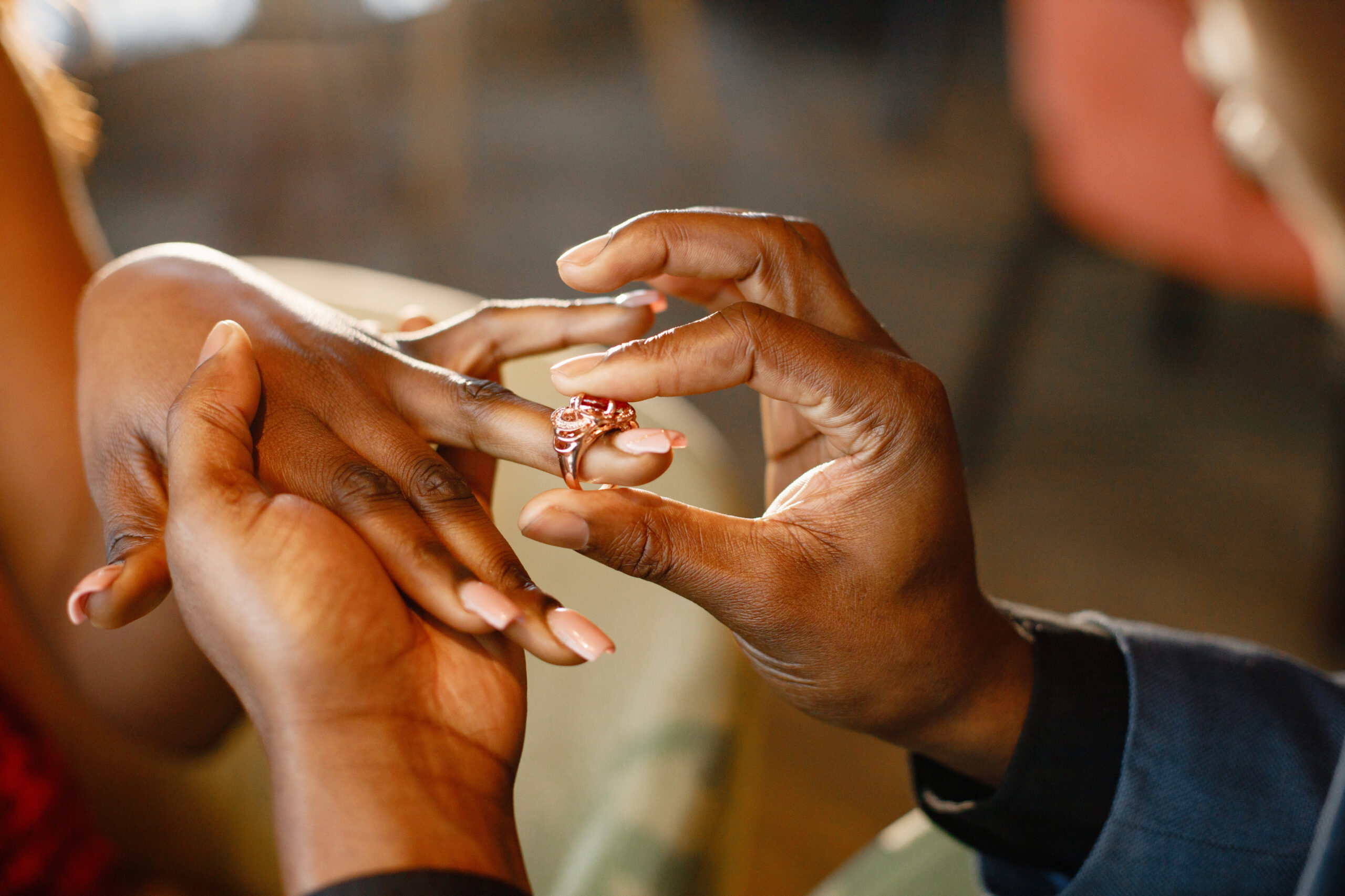Here’s the brutal truth nobody wants to hear: most couples spend more time planning their wedding menu than planning their actual marriage.
They’ll debate centerpieces for months but won’t spend an hour discussing their life goals, money management, or family plans.
As a relationship therapist with over 15 years of experience helping couples navigate their biggest challenges, I can tell you this: the questions you ask before marriage determine whether you’ll be celebrating your 50th anniversary or signing divorce papers before your 5th.
Ready to have the conversations that could save your future marriage? Let’s get uncomfortably honest about what you NEED to discuss before you say “I do.”
Why These Conversations Matter More Than Your Wedding Dress
Before we jump into the questions, let me share something that might shock you: research shows that couples who have deep, meaningful conversations before marriage are 30% more likely to stay married long-term.
Yet most engaged couples are so caught up in wedding planning that they treat pre-marriage conversations like a quick checklist. Big mistake. These aren’t just conversations, they’re the blueprint for your entire future together.
I’ve seen gorgeous weddings followed by ugly divorces because the couple never bothered to discuss fundamental incompatibilities.
Don’t let Pinterest-perfect wedding planning blind you to the reality that marriage is a lifelong business partnership with the person you love most.
Questions to Ask Before Marriage

1. Where Do You Stand On Kids?
Oh boy, this is the big one. I cannot stress this enough: you MUST be on the same page about children before you get married. This isn’t something you can compromise on or “figure out later.”
I’ve worked with too many couples who assumed their partner would “change their mind” about having kids. Spoiler alert: people rarely change their minds about something this fundamental, and resentment
builds fast when they don’t. Essential questions to discuss:
- Do we both want children? (This is non-negotiable territory)
- How many kids do we envision having?
- What’s our timeline for starting a family?
- What happens if we struggle with fertility? Are we open to IVF, adoption, or remaining childless?
- How will we handle childcare? Will one parent stay home, or will we both work?
- What’s our parenting philosophy? Strict vs. relaxed, religious vs. secular, etc.
Here’s a reality check: if one of you wants kids and the other doesn’t, this relationship has an expiration date. I’ve never seen this fundamental incompatibility work out long-term without someone becoming deeply unhappy.
2. What Should I Know About Your Upbringing?
Your partner’s childhood is like a roadmap to their adult behavior. Understanding their family dynamics gives you incredible insight into how they’ll handle conflict, show love, and navigate stress in your marriage.
I always tell my clients: you’re not just marrying your partner – you’re marrying their family patterns, learned behaviors, and childhood coping mechanisms. The good news? Awareness gives you the power to choose which patterns to continue and which ones to break.
Critical questions to explore:
- How did your parents handle conflict? Yelling, silent treatment, or healthy discussion?
- What did love look like in your family? Verbal affection, acts of service, or emotional distance?
- How were emotions handled? Were feelings discussed openly or pushed down and ignored?
- What family traditions do you want to continue in our marriage?
- Are there family patterns you’re determined to break?
I remember working with a couple where the husband came from a family that never said “I love you” out loud. His wife felt unloved and rejected for years until we traced it back to his upbringing. Once they understood the pattern, they could work together to create new ones.
3. Money Questions To Ask Before Marriage

Money fights destroy more marriages than infidelity does. Let me repeat that: financial disagreements are the #1 cause of divorce in America. Yet most couples have surface-level money conversations
before marriage.
You need to get uncomfortably specific about finances. I’m talking about sharing bank statements, credit scores, debt totals, and spending habits. If your partner gets weird about money transparency, that’s already a red flag.
Essential Financial Questions:
Current Financial Status:
- What’s your exact debt situation (credit cards, student loans, car payments)
- What’s your credit score and financial history?
- How much do you have in savings and investments?
- What’s your current income and career trajectory?
Money Management Style:
- Are you a saver or spender by nature?
- How do you make big purchase decisions?
- Do you budget or just wing it with money?
- What’s your comfort level with debt?
Future Financial Goals:
- Do we want to buy a house together?
- When and where? What are our retirement savings goals?
- How much should we save for emergencies?
- What about life insurance and financial planning?
Joint vs. Separate Finances:
- Will we have joint bank accounts or keep money separate?
- How will we split expenses and bills?
- What’s our spending limit before discussing purchases together?
- How will we handle it if one person earns significantly more?
IMO, couples who can’t have honest money conversations before marriage are setting themselves up for years of financial fights.
4. Questions About Religious Orientation

Religion and spirituality can either bring couples closer together or drive them completely apart. You don’t have to share the same faith, but you absolutely must respect each other’s beliefs and create a plan that works for both of you.
I’ve seen marriages crumble because one partner felt forced to abandon their faith or because couples couldn’t agree on how to raise their children spiritually.
Key questions to address:
- How important is religion in your daily life?
- What role do you want faith to play in our marriage?
- Will we attend religious services together, or is it okay if we worship separately?
- How will we handle religious holidays and family traditions?
- What about our children? Will we raise them in a specific faith?
- Are there religious practices you want to incorporate into our home life?
Pro tip: if your partner gets defensive or dismissive about your spiritual beliefs, pay attention. That attitude won’t magically improve after marriage.
5. How Do You Show And Accept Love?
This might sound fluffy, but understanding each other’s love languages can literally save your marriage. I’ve seen couples who love each other deeply but feel completely unloved because they’re speaking different emotional languages.
Here’s what you need to figure out together:
- How do you prefer to receive love? Words of affirmation, quality time, physical touch, acts of service, or gifts?
- How do you naturally show love? Do you express feelings verbally, through actions, or physical affection?
- What makes you feel most appreciated and valued in a relationship?
- How do you handle affection in public vs. private settings?
- What does emotional support look like to you when you’re stressed or struggling?
I remember a client whose husband showed love by doing household chores, but she needed verbal affirmation. For years, she felt unloved while he felt unappreciated. Once they understood their different love languages, everything changed.
Financial Questions to Ask Before Marriage

Money conversations are where most couples chicken out, but financial compatibility is absolutely crucial for marriage success. Let me break down the money talks you cannot skip:
6. How Do You Feel About Debt?
This isn’t just about current debt – it’s about your fundamental relationship with borrowed money. Some people see debt as a tool; others see it as a nightmare to avoid at all costs.
I’ve watched couples destroy their marriages over credit card debt because they had completely different comfort levels with financial risk. One person’s “reasonable purchase” is another person’s “financial irresponsibility.”
Discuss these specifics:
- Current debt totals and payment plans
- Comfort level with credit card balances
- Attitudes toward mortgages and car loans
- Plans for paying off existing debt
- Future borrowing decisions
7. When Will You Discuss Your Finances?
Financial transparency requires regular check-ins. You can’t just have one money conversation and call it good for the next 20 years.
Decide together:
- How often will you review finances together?
- What triggers a financial discussion (big purchases, budget concerns)?
- Who manages day-to-day money decisions?
- How will you handle financial disagreements?
I recommend monthly money meetings for most couples. It keeps you both informed and prevents financial surprises that can damage trust.
8. How Will You Compromise On Financial Issues?
Every couple has different financial priorities. The key is finding compromises that don’t leave either partner feeling resentful or controlled.
Important compromises to discuss:
Individual spending money that doesn’t require discussion
Shared financial goals vs. personal financial goals
Lifestyle choices that impact money (dining out, travel, hobbies)
Emergency situations and financial decision-making
9. Will You Merge Your Finances?
There’s no “right” way to handle joint finances, but you need to decide together what works for your relationship.
Options to consider:
- Completely joint accounts for everything
- Separate accounts with shared expenses split proportionally
- Hybrid approach with joint accounts for shared expenses and separate accounts for personal spending
- One person manages finances while keeping the other informed
FYI, whatever system you choose, both partners need full transparency and input into financial decisions.
10. What Do You Spend Money On?
This is where couples often discover deal-breaking incompatibilities. Your partner’s spending priorities reveal their values, and you need to know if you can live with them long-term.
Key areas to explore:
- Hobbies and entertainment expenses
- Gift-giving expectations and budgets
- Travel and vacation priorities
- Home and lifestyle spending
- Career development and education investments
I worked with a couple who almost divorced because she couldn’t understand why he spent $500 monthly on golf while complaining they couldn’t afford date nights. They weren’t just fighting about money, they were fighting about priorities and values.
6 Questions To Ask Yourself Before Settling Down

Before you can have productive conversations with your partner, you need to get brutally honest with yourself. I make all my engaged clients go through this self-reflection process because you can’t build a healthy marriage if you don’t understand your own motivations.
1. Is This What I Want?
This sounds obvious, but you’d be amazed how many people get married because it feels like the “next step” rather than because they genuinely want to be married.
Ask yourself:
- Am I excited about marriage or just going through the motions?
- Do I want this specific marriage or just the idea of being married?
- Am I choosing marriage or just avoiding being single?
- Does the thought of forever with this person make me happy or anxious?
If you’re not 100% sure you want this marriage, please don’t go through with it. It’s better to hurt someone’s feelings now than destroy both your lives later.
2. Why Am I Doing This?
Your motivation for marriage matters more than you think. I’ve worked with people who got married for visa reasons, family pressure, pregnancy scares, fear of loneliness, or social expectations. None of those marriages lasted.
Healthy reasons to get married:
- Deep love and compatibility with your partner
- Shared life goals and values
- Genuine excitement about building a life together
- Feeling like your partner makes you a better person
Unhealthy reasons to get married:
- Fear of being alone or starting over
- Family or social pressure to “settle down”
- Financial security or practical benefits
- Hoping marriage will fix existing relationship problems
Marriage amplifies what’s already there – it doesn’t magically solve problems or create love that wasn’t there before.
3. Do I Want To Raise A Family?
This goes deeper than just “do I want kids?” You need to envision yourself as a parent and honestly assess whether that life appeals to you.
Consider these aspects:
- The daily reality of parenting (sleepless nights, constant responsibility, financial pressure)
- How children will change your relationship dynamic
- Your partner’s parenting potential based on what you’ve observed
- The long-term commitment of raising humans into functional adults
I’ve seen people convince themselves they want kids because their partner does, only to become resentful parents later. Don’t have children to save your marriage or make someone else happy.
4. Can I Do This Forever?
Forever is a really long time. Are you ready to choose this one person through job losses, health crises, family drama, physical changes, and all the curveballs life throws at you?
Think about:
- Your partner’s worst qualities – can you accept them long-term?
- How you handle conflict together – is it sustainable?
- Your sexual compatibility – are you both satisfied?
- Life changes – careers, moves, aging parents, health issues
If you’re already having doubts about “forever,” marriage isn’t going to fix those concerns.
5. Is Marriage Necessary?
Here’s a question most people never ask: do we actually need to get married, or do we just think we should?
Consider alternatives:
- Long-term committed partnership without legal marriage
- Common-law marriage if available in your area
- Civil unions or domestic partnerships
- Living together without any legal commitment
Marriage isn’t required for love, commitment, or even family-building. Make sure you’re choosing marriage because you want the specific benefits and commitments it brings, not because you think you “should.”
6. Am I Ready?
Age isn’t everything, but maturity absolutely is. Are you emotionally, financially, and psychologically ready for marriage?
Signs you might not be ready:
- You’re still figuring out who you are as an individual
- Financial instability or major career uncertainty
- Unresolved mental health or addiction issues
- Family drama or major life transitions happening
- Feeling rushed or pressured to get married
There’s no shame in waiting until you’re truly ready. Marriage will always be an option, but your readiness window is crucial for success.
Red Flags During Pre-Marriage Conversations

Watch out for these warning signs during your discussions:
Communication Red Flags
- Refusing to answer important questions
- Getting defensive instead of engaging thoughtfully
- Dismissing your concerns as “not important”
- Changing the subject when conversations get serious
- Making jokes to avoid serious discussions
Compatibility Red Flags
- Fundamentally different values about important issues
- Unwillingness to compromise on anything
- Disrespect for your beliefs or lifestyle choices
- Expecting you to change major aspects of yourself
- Hidden aspects of their personality or past
Future Planning Red Flags
- Vague answers about future goals and plans
- Unrealistic expectations about marriage or life
- Resistance to planning or goal-setting together
- Different timelines for major life decisions
- Conflicting visions of your life together
How To Have These Conversations Without Ruining Your Relationship

Let’s be real: some of these conversations are going to be awkward, uncomfortable, or even scary. But having them now is infinitely better than discovering incompatibilities after you’re legally bound together.
Setting The Stage
- Choose the right time – not when you’re stressed, tired, or distracted
- Create a safe space where both people can be honest without judgment
- Start with easier topics and work up to the more challenging ones
- Approach it as a team – you’re planning your future together, not interrogating each other
Communication Guidelines
- Listen without getting defensive or planning your rebuttal
- Ask follow-up questions to really understand their perspective
- Share your own thoughts honestly even if they differ from your partner’s
- Take breaks if conversations get too intense or emotional
- Come back to difficult topics rather than avoiding them
Remember: the goal isn’t to agree on everything, but to understand each other completely and find workable compromises.
When Pre-Marriage Conversations Reveal Deal-Breakers
Sometimes these conversations reveal incompatibilities that can’t be compromised away. That’s not a failure – that’s valuable information that can save you both from years of unhappiness.
Common deal-breakers I see in my practice:
- Fundamental disagreement about having children
- Completely different financial values and goals
- Religious incompatibility that affects daily life
- Different definitions of commitment or fidelity
- Incompatible life goals or career priorities
If you discover a true deal-breaker, please take it seriously. Love isn’t always enough to overcome fundamental incompatibilities, and trying to force it usually leads to resentment and heartbreak.
Creating Your Pre-Marriage Conversation Plan
Ready to start these important discussions? Here’s a practical approach that works:
Week 1: Individual Reflection
Spend time alone thinking about your answers to all these questions before discussing them together. You can’t have an honest conversation with your partner if you’re not being honest with yourself first.
Week 2: Easy Topics First
Start with conversations about family traditions, love languages, and shared interests. Build your communication skills on easier topics before tackling the heavy stuff.
Week 3: The Big Questions
Address children, money, religion, and career goals. Take your time with these – they deserve multiple conversations, not just one rushed discussion.
Week 4: Future Planning
Talk about your vision for the next 5, 10, and 20 years. Discuss potential challenges and how you’ll handle them together.
Week 5: Deal-Breaker Assessment
Honestly evaluate what you’ve learned about each other. Are there any incompatibilities that feel impossible to work through?
The Bottom Line: Better To Know Now Than Learn Later

Here’s what I want you to remember: asking tough questions before marriage isn’t pessimistic – it’s smart. You’re not planning for failure; you’re planning for success by going in with your eyes wide open.
I’ve seen too many couples sit in my office saying “I wish we had talked about this before we got married.” Don’t let that be you. These conversations might feel uncomfortable now, but they’re infinitely more comfortable than divorce proceedings later.
The couples who make it long-term? They’re the ones who did the hard work upfront. They asked the difficult questions, worked through the tough conversations, and entered marriage as genuine partners with realistic expectations.
Your engagement period is practice time for the communication skills you’ll need for the next 50+ years. Use it wisely.
If these conversations reveal that you and your partner are incredibly compatible and excited about your shared future, congratulations! You’re building your marriage on a solid foundation.
If they reveal some areas that need work, that’s valuable information too. Better to address incompatibilities now than discover them after you’ve already said “I do.”
And if they reveal deal-breaking incompatibilities? Thank yourself for being brave enough to ask the hard questions before making a lifelong commitment.
Either way, you win by choosing knowledge over ignorance, preparation over hope, and honest communication over crossed fingers :/
What questions are you most nervous about asking your partner? Remember, the conversations that scare you most are usually the ones you need to have most urgently. Your future marriage depends on your courage to have them now.







